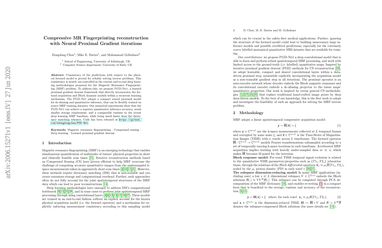Compressive MR Fingerprinting reconstruction with Neural Proximal Gradient iterations
Consistency of the predictions with respect to the physical forward model is pivotal for reliably solving inverse problems. This consistency is mostly un-controlled in the current end-to-end deep learning methodologies proposed for the Magnetic Resonance Fingerprinting (MRF) problem. To address this, we propose ProxNet, a learned proximal gradient descent framework that directly incorporates the forward acquisition and Bloch dynamic models within a recurrent learning mechanism. The ProxNet adopts a compact neural proximal model for de-aliasing and quantitative inference, that can be flexibly trained on scarce MRF training datasets. Our numerical experiments show that the ProxNet can achieve a superior quantitative inference accuracy, much smaller storage requirement, and a comparable runtime to the recent deep learning MRF baselines, while being much faster than the dictionary matching schemes. Code has been released at https://github.com/edongdongchen/PGD-Net.
PDF Abstract


